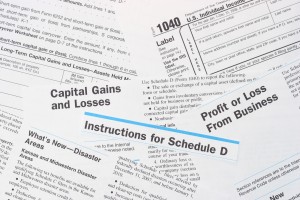As you prepare tax documents and receipts for your 2016 income tax returns, pay close attention to the items that you’ll need for business expense deductions. Deducting business expenses can lower your taxable income. Even if you aren’t self-employed or a small business owner, you can take certain business-related deductions as an individual.
Individual Tax Returns
If you are an employee, you may be able to deduct work-related expenses as miscellaneous itemized deductions. These deductions must exceed the standard deduction as well as 2 percent of your adjusted gross income. This is commonly known as the “2 percent floor,” meaning you may only deduct expenses above that amount. All deducted expenses must be from the 2016 calendar year, be business-related, and be “ordinary and necessary.”
Here are some common deductions and guidelines:
Vehicle and Travel
- Although expenses for your regular daily commute, including parking, aren’t deductible, some local transportation costs qualify. For example, traveling from one workplace location to another would qualify, as well as from your home office to another workplace location if your home office is your primary place of business for your employer. Parking fees for a business meeting outside of your usual daily commute are deductible. More information about home offices and transportation costs is available from the IRS website.
- Use standard mileage rates to calculate deductible costs if operating your personal vehicle for business purposes. 2016 mileage rates are 54 cents per mile for business miles, such as traveling to meet a client or attend a conference. If you do not use the standard mileage rate, you can deduct actual car expenses for the year.
- While on a business trip, you can deduct costs incurred such as airline, train, or taxi fares, car rental, baggage fees, meals, lodging, and tips. Find more details here.
Entertainment Expenses
- Business entertainment expenses are subject to certain limits. Generally, 50 percent of meal and entertainment expenses are allowed, with records to prove their business purpose. Learn more.
Home Office
Use of part of your home exclusively and regularly for conducting business may also allow for deductions of certain expenses, such as mortgage interest, property taxes, utilities, and home repairs. Learn more about the requirements to claim these deductions.
Other Potential Deductions
- Memberships or dues to professional organizations
- Job search expenses, including travel expenses
- Work clothes or uniforms that are a condition of your employment, but that would not be suitable for everyday use
Small Business & Self-Employed
If you are self-employed or the owner of a small business, there are additional deductions and requirements to consider when filing your business taxes, excluding cost of goods sold, capital expenses, and personal expenses. Some deductible business expenses include:
- Fees for professional services
- Employee wages and benefits, such as health or life insurance, as well as contributions to retirement plans or profit-sharing
- Advertising costs
Education expenses, such as fees for seminars or courses to maintain professional certifications - Fees for banking, attorney, or accountant services
- Federal, state, and local, payroll taxes
Refer to the IRS website for additional information on these and other business expenses deductions, or contact Ramsay & Associates with your questions. We provide tax preparation services businesses as well as individuals. Call us at 651.429.9111.





